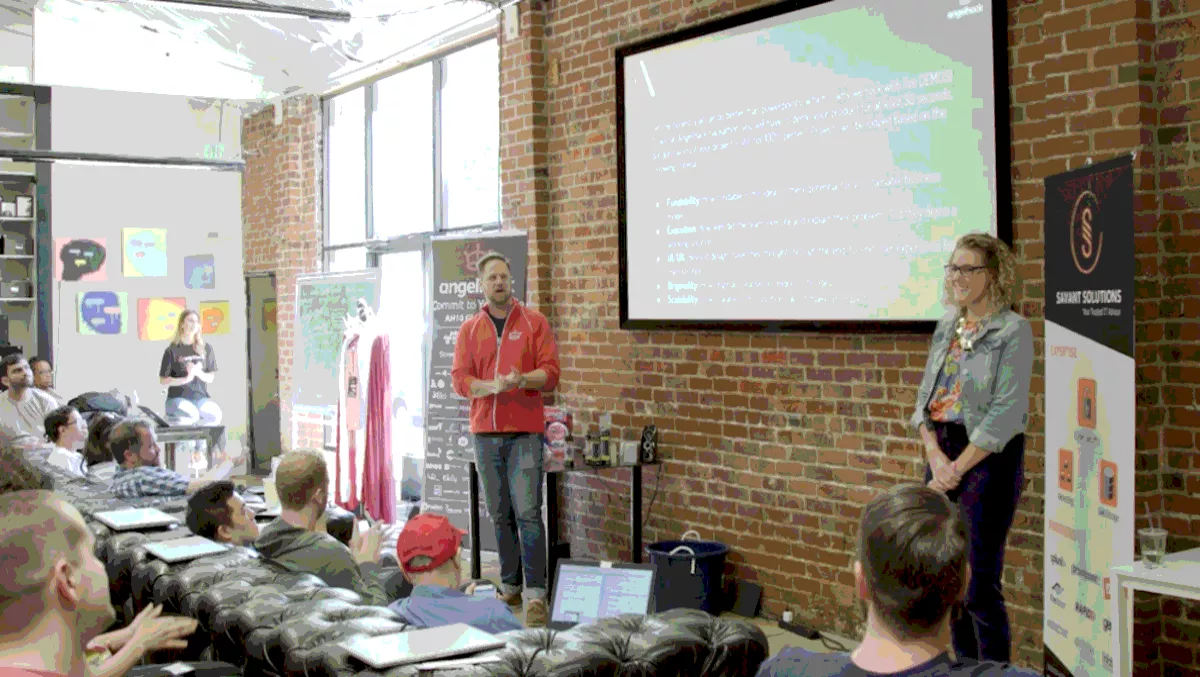
SheStarts alumni discuss wins and challenges post-accelerator
The SheStarts startup programme is a swirl of cameras, advice, support and cameras for the next generation of female tech entrepreneurs.
But what happens when the cameras turn off?
As the next cohort of SheStarts entrepreneurs takes their first steps in the world of tech, the last crop has been busy.
Anna Wright, founder of BanjoMaps is rapidly closing in on a seven-figure capital raise.
Sally Coldham, the founder of Airloom, is focused on product development.
Jessica Christiansen-Franks, co-founder of Neighbourlytics, has taken the first steps towards international expansion.
We caught up with them to see where they were at, what they learned from the SheStarts program and what it's like in the big, bad world.
'S**t, this is real'
After a wrap-up gala in August attended by potential investors and partners, the inaugural SheStarts program formally came to an end.
But Wright says that it didn't mean that they were cut off from business enabler and investor BlueChilli.
"One of the benefits of being in an accelerator program is that even once you finish the formal process, you're not evicted," she says.
She says in between putting together a capital-raising project, she had found the time to go back to the BlueChilli offices and catch up with people there.
"My advice for anyone feeling a bit isolated is to just go find a co-working space and you will find people there. If nothing else, you can get a coffee with them," says Wright.
Arriving at the end of a programme like SheStarts has the potential to leave people aimless, much like what some people can experience after high school or uni finishes up.
She says it was important to reach out to former mentors and fellow SheStarts founders where she could – because the world outside the accelerator is very different to the world inside.
"There are definitely moments when I've thought 's**t, this is real'," says Wright.
"In an incubator, everybody thinks that yes it will be possible and you will succeed. Of course, on the outside, most people say 'You're crazy, this is never going to work'.
"So you have to deal with that and have that tough skin.
Product, product, product
Coldham says she still felt very supported by BlueChilli after the SheStarts programme had wrapped up, but there were still moments when she thought she definitely wasn't in Kansas anymore.
"I think one of the things I miss the most is the regular catch-up with the rest of the cohort. We were seeing each other once a fortnight, and without knowing it now lots of us are experiencing the same problems," she says.
While SheStarts gives participants a crash course in building a tech startup, Coldham says she had taken the freedom afforded to her by the end of the program to re-focus on getting Airloom into the best shape it could be before raising capital.
"Without the product, you're not going to get the partnerships, you're not going to get the investment, the customers, the marketing…it all comes down to building that great product.
"It was OK to leave things like writing content or social media posts aside to refocus on what was important.
She said the greatest lesson she learned while at SheStarts was to back her own judgement.
"The biggest thing I learned was nobody has the right answer. Nobody knows the right thing for you, nobody has the golden ticket piece of advice. It all comes down to you," says Coldham.
"I know this problem and this business better than anybody else. Nobody can give me the perfect advice, which made me realise that I can do it on my own and that I should trust my instincts.
Eyes on the horizon
Meanwhile, the SheStarts San Francisco trip in 2017 gave Christiansen-Franks a view towards international markets.
"That trip completely changed our outlook on what we're doing and what the opportunity is," she says.
"Going to startup land and meeting the other businesses who have done what we're trying to do gave us a sense of what the growth opportunity is here.
Subsequently, while trying to build the business in Australia, Neighbourlytics also has its eyes in markets in the US, UK, and possibly even Spain.
"We're still targeting growth in Australia but we're putting that pressure on us to book international work," she says.
She said the main lesson the program had taught her was simply to be confident in her own abilities – even if she didn't know how to code.
"I think it was the validation and self-belief, especially being a non-technical founder," says Christiansen-Franks.
She said that belief had come to the fore when bringing people in to help with various aspects of the business.
Because she didn't have expertise in several areas, she assumed that she had to hire in people to help – only to find that they simply 'didn't get' what Neighbourlytics was trying to do.
"I had a better idea of what we were trying to build than they did – and I wasted a lot of time and money on that," she says.
"Now I know I am the best person to run this, and I don't need to outsource that kind of decision making – so our approach is hiring staff and in-housing capability.
"It's our company building it rather than the so-called expertise of others. I think that's serving us really well now.
This article was originally published on MYOB's blog, The Pulse. For more business news and tips, visit www.myob.com/blog.

